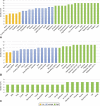Herbal Medicinal Product Use During Pregnancy and the Postnatal Period: A Systematic Review
- PMID: 30969204
- PMCID: PMC6485309
- DOI: 10.1097/AOG.0000000000003217
Herbal Medicinal Product Use During Pregnancy and the Postnatal Period: A Systematic Review
Abstract
Objective: To report the incidence and nature of herbal medicinal products' adverse events and herb-drug interactions used by some pregnant and postnatal women.
Data sources: The Allied and Complementary Medicine Database, the Cumulative Index to Nursing and Allied Health Literature, EMBASE, the Cochrane Library, MEDLINE, Scopus, Web of Science, and ClinicalTrials.gov were searched from inception until August 2018.
Methods of study selection: Any studies reporting adverse events, herb-drug interactions or absence thereof associated with herbal medicinal products used during pregnancy or the postnatal period were included. Conference abstracts, pilot studies, and nonhuman studies were excluded. All included studies were critically appraised by two independent reviewers.
Tabulation, integration and results: Database searches retrieved 3,487 citations. After duplicate removal and review of titles, abstracts, and full-text, 115 articles were critically appraised. After excluding irrelevant and low-quality articles, 74 articles were included for data extraction and synthesis. Adverse drug reactions, congenital malformations, fetal growth retardation or herb-drug interactions were the primary study objective reported by 19 of the 74 included studies, 16 cohort studies, one cross-sectional survey, and two randomized controlled trials. A total of 47 herbal medicinal products and 1,067,071 women were included in this review. Use of almond oil was associated with preterm birth (odds ratio 2.09, 95% CI 1.07-4.08), oral raspberry leaf was associated with cesarean delivery (adjusted odds ratio [AOR] 3.47, 95% CI 1.45-8.28); heavy licorice use was associated with early preterm birth by 3.07-fold (95% CI 1.17-8.05). African herbal medicine mwanaphepo was associated with maternal morbidity (AOR 1.28; 95% CI 1.09-1.50), and neonatal death or morbidity. Fourteen studies reported absence of adverse events. Four studies reported herb-drug interactions, but none studied adverse events arising from them.
Conclusion: The use of herbal medicinal products during pregnancy and the postnatal period should be discouraged until robust evidence of safety is available.
Systematic review registration: PROSPERO, CRD42017081058.
Figures



References
-
- Merriam-Webster.com. Herbal medicine. Available at: https://www.merriam-webster.com/dictionary/herbal%20medicine. Retrieved September 28, 2018.
-
- Koren G, Randor S, Martin S, Danneman D. Maternal ginseng use associated with neonatal androgenization. JAMA 1990;264:2866. - PubMed
-
- Eisenberg DM, Davis RB, Ettner SL, Appel S, Wilkey S, Van Rompay M, et al. Trends in alternative medicine use in the United States, 1990-1997: results of a follow-up national survey. JAMA 1998;280:1569–75. - PubMed
Publication types
MeSH terms
Substances
LinkOut - more resources
Full Text Sources
Medical
Research Materials

